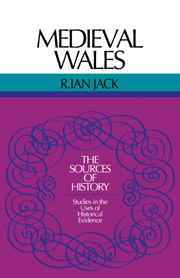Book contents
- Frontmatter
- Contents
- Abbreviations
- General Editor's Introduction
- Preface
- 1 Literary Sources
- 2 The Official Records of Wales and Their Preservation
- 3 The Records of the English Government
- 4 Archives of Individuals and Corporations
- 5 Ecclesiastical Records
- 6 The Antiquaries
- 7 Archaeology and Numismatics
- 8 Cartography and Place-Names
- 9 Conclusion
- Index
7 - Archaeology and Numismatics
Published online by Cambridge University Press: 07 October 2011
- Frontmatter
- Contents
- Abbreviations
- General Editor's Introduction
- Preface
- 1 Literary Sources
- 2 The Official Records of Wales and Their Preservation
- 3 The Records of the English Government
- 4 Archives of Individuals and Corporations
- 5 Ecclesiastical Records
- 6 The Antiquaries
- 7 Archaeology and Numismatics
- 8 Cartography and Place-Names
- 9 Conclusion
- Index
Summary
The material remains of medieval Wales are essential complements to literary and archival evidence. In some areas of enquiry they are more equal partners than in others, but there are few topics which can be treated from exclusively written or exclusively material sources. Although coins are as much archaeological as castles or barrows, the science of numismatics is so specialised a part of archaeology that it is best treated separately, but its place in the wider context of excavation, exploration and dating of remains should not be forgotten.
ARCHAEOLOGY
Welsh archaeology is characteristically the archaeology of the living: Anglo-Saxon archaeology is dominated by the dead. The grave-goods of so many pagan graves of early England have no counterpart in the Christian graves of contemporary Wales. Instead the material evidences for early Welsh history are settlement sites and inscribed stones. The standing stones of still earlier Wales have value, too, in giving a local habitation to some of the heroic names in the Mabinogion and the ‘Stanzas of the Graves’, but, although they allow fascinating detective work and hint at the processes of rationalisation and connection which created Welsh stories, they do not really advance historical study very dramatically.
The interpretation of the settlement sites is made difficult because of the lack of datable pottery. Since pottery, as Dr Myres has recently demonstrated, is a key element in Anglo-Saxon archaeology, the dearth in Wales is a serious handicap.
- Type
- Chapter
- Information
- Medieval Wales , pp. 185 - 212Publisher: Cambridge University PressPrint publication year: 1976



